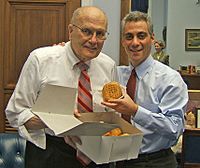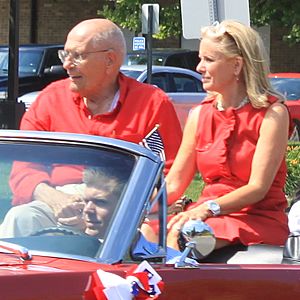John Dingell facts for kids
Quick facts for kids
John Dingell
|
|
|---|---|
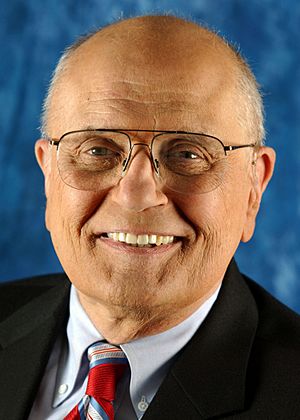 |
|
| 43rd Dean of the United States House of Representatives | |
| In office January 3, 1995 – January 3, 2015 |
|
| Preceded by | Jamie Whitten |
| Succeeded by | John Conyers |
| Member of the U.S. House of Representatives from Michigan |
|
| In office December 13, 1955 – January 3, 2015 |
|
| Preceded by | John Dingell Sr. |
| Succeeded by | Debbie Dingell |
| Constituency | 15th district (1955–1965) 16th district (1965–2003) 15th district (2003–2013) 12th district (2013–2015) |
| Chair of the House Energy and Commerce Committee | |
| In office January 3, 2007 – January 3, 2009 |
|
| Preceded by | Joe Barton |
| Succeeded by | Henry Waxman |
| In office January 3, 1981 – January 3, 1995 |
|
| Preceded by | Harley Orrin Staggers |
| Succeeded by | Thomas J. Bliley Jr. |
| Ranking Member of the House Energy and Commerce Committee | |
| In office January 3, 1995 – January 3, 2007 |
|
| Preceded by | Carlos Moorhead |
| Succeeded by | Joe Barton |
| Personal details | |
| Born |
John David Dingell Jr.
July 8, 1926 Colorado Springs, Colorado, U.S. |
| Died | February 7, 2019 (aged 92) Dearborn, Michigan, U.S. |
| Resting place | Arlington National Cemetery |
| Political party | Democratic |
| Spouses |
Helen Henebry
(m. 1952; div. 1972)Debbie Insley
(m. 1981) |
| Children | 4, including Christopher |
| Relatives | John D. Dingell Sr. (father) |
| Education | Georgetown University (BS, JD) |
| Signature |  |
| Military service | |
| Allegiance | United States |
| Branch/service | United States Army |
| Years of service | 1944–1946 |
| Rank | Second lieutenant |
| Battles/wars | World War II |
John David Dingell Jr. (July 8, 1926 – February 7, 2019) was an American politician. He served in the United States House of Representatives from 1955 to 2015. He was a member of the Democratic Party. John Dingell holds the record for the longest time served in Congress in American history. He represented the state of Michigan for over 59 years.
He was the representative for Michigan's 12th congressional district when he retired. Dingell was a long-time member of the House Energy and Commerce Committee. He led this committee as chairman from 1981 to 1995 and again from 2007 to 2009.
John Dingell was born in Colorado Springs, Colorado. He went to Georgetown University for both his undergraduate and law degrees. He started his career in Congress by taking over his father's seat. His father, John Dingell Sr., had held the seat for 22 years. John Jr. left office on January 3, 2015. He served under 11 different Presidents, which is more than almost any other representative. He was also the Dean of the U.S. House of Representatives from 1995 to 2015.
During his time in Congress, Dingell helped pass many important laws. These included the Medicare Act, the Clean Water Act of 1972, the Endangered Species Act of 1973, and the Clean Air Act of 1990. He was most proud of his work on the Civil Rights Act of 1964. In 2014, President Barack Obama gave him the Presidential Medal of Freedom. His wife, Debbie Dingell, was elected to take his place in Congress.
Contents
Early Life and Education
John Dingell Jr. was born on July 8, 1926. His parents were Grace and John Dingell Sr.. His family moved to Colorado because his father was sick. His father's family came from Poland, and his mother's family had Swiss and Scots-Irish roots.
The family later moved back to Michigan. In 1932, his father was elected to Congress. John Jr. attended Georgetown Preparatory School. He also served as a page for the U.S. House of Representatives from 1938 to 1943. He was actually on the House floor when President Franklin D. Roosevelt gave his famous speech after the attack on Pearl Harbor.
Military Service in World War II
In 1944, when he was 18, Dingell joined the United States Army. He became a second lieutenant. He was set to be part of a planned invasion of Japan in November 1945. However, President Harry S. Truman decided to use the atomic bomb to end the war. Dingell later said that this decision saved his life.
After the war, Dingell went to Georgetown University. He earned a degree in chemistry in 1949 and a law degree in 1952. Before becoming a politician, he worked as a lawyer. He was also a research assistant for a judge, a congressional employee, and a forest ranger. He even worked as a prosecutor for Wayne County.
Serving in the U.S. House of Representatives
How He Was Elected
In 1955, John Dingell Sr. passed away. John Jr. won a special election to take his father's place in Congress. He then won a full term in 1956. He was reelected 29 more times! In some elections, like in 1988 and 2006, he didn't even have an opponent from the Republican party.
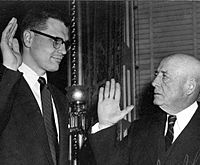
Between John Dingell Jr. and his father, they represented the southeastern Michigan area for 80 years. His district changed numbers over the years due to redistricting. This is when the lines of voting districts are redrawn based on population changes.
In 2002, his district merged with another. He won against another Democratic representative in the primary election. Dingell always won his re-elections by a lot of votes. When other long-serving representatives retired or were defeated in 1995, he became the Dean of the United States House of Representatives. This title goes to the longest-serving member of the House.
His Time in Congress
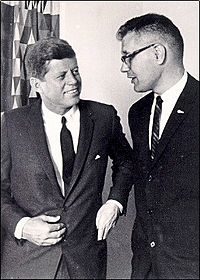
John Dingell was known as a moderately liberal Democrat. Throughout his career, he strongly supported organized labor (workers' unions). He also backed social welfare programs and other progressive ideas.
Every time a new Congress started, Dingell would introduce a bill for a national health insurance system. This was the same bill his father had proposed. He also strongly supported President Bill Clinton's healthcare plans in the 1990s.
Dingell was a big fan of sports and hunting. He was against strict gun control laws. For many years, he had a high rating from the National Rifle Association. He helped make sure that firearms were not covered by a law that allows defective products to be recalled.
On December 15, 2005, Dingell read a poem in the House. It was critical of certain news channels and commentators. On June 7, 2013, Dingell became the longest-serving member of Congress ever. He passed Senator Robert Byrd's record for combined time in the House and Senate. By the time he retired on January 3, 2015, he had served 21,571 days in Congress.
Leading the Energy and Commerce Committee
Dingell was famous for how he oversaw the executive branch. He would call many government officials to testify before his committee. He would question them for hours. He made sure everyone testified under oath. This meant they could face charges if they didn't tell the truth.
He and his committee found many cases of waste and corruption. For example, they found that the Pentagon was using $600 toilet seats. He said his committee's work led to many officials leaving their jobs. It also led to legal cases that sent some officials to jail.
Dingell became chairman of the committee again in 2007. He wanted to look into how the government handled port security and other programs. He also planned to work on laws about global warming and climate change.
In 2008, Dingell lost the chairmanship to Congressman Henry Waxman. Some thought Dingell was slowing down environmental laws. These laws would have made car emissions stricter. This could have hurt the Big Three automobile manufacturers in his district. Dingell was given the title of Chairman Emeritus. This was to honor his many years of service.
Protecting the Environment
The League of Conservation Voters (LCV) gave Dingell its highest rating for his work on environmental issues. They said he voted "pro-environment" on all important issues. They also praised him for introducing an amendment. This amendment would make the United States Environmental Protection Agency (EPA) protect certain water bodies. These water bodies are important for wildlife and drinking water.
Dingell was also a member of the Congressional Wildlife Refuge Caucus. This group works to protect wildlife refuges. He helped write the first car fuel efficiency standards in the 1970s. He later worked to increase these standards. In 2007, he helped draft an energy bill. This bill would increase fuel efficiency standards by 40%.
In 1999, Dingell released a report. It showed that poor management led to a huge waste of taxpayer money. This was for a project that produced dangerous gas. In 2007, Dingell suggested a new tax on carbon use. This would help reduce greenhouse gas emissions. As one of his last votes, Dingell voted against the Keystone XL pipeline in 2014.
Ties to the Auto Industry
Dingell had strong connections to the auto industry. His district was in Metro Detroit, where the Big Three automakers (General Motors, Chrysler, and Ford) are located. He encouraged these companies to make cars more fuel-efficient. During the automotive industry crisis of 2008–10, Dingell supported the government's financial help for these companies.
His wife, Debbie Dingell, is related to the founders of Fisher Body, which is part of General Motors. She worked for General Motors in different roles.
Committee Assignments
- Committee on Energy and Commerce
- Subcommittee on Commerce, Manufacturing and Trade
- Subcommittee on Communications and Technology
- Subcommittee on Energy and Power
- Subcommittee on Environment and Economy
- Subcommittee on Health
- Subcommittee on Oversight and Investigations
Personal Life
John Dingell had four children from his first marriage to Helen Henebry. They were married in 1952 and divorced in 1972. His son, Christopher D. Dingell, became a judge.
In 1981, Dingell married Deborah "Debbie" Insley. In November 2014, Debbie Dingell won the election to take her husband's place in Congress. She became the U.S. Representative for Michigan's 12th congressional district. She was the first woman to immediately succeed her husband in Congress without being a widow.
In his later years, Dingell became very active on Twitter. He gained many followers for his witty and sometimes sarcastic posts. He was even nicknamed "the Dean of Twitter."
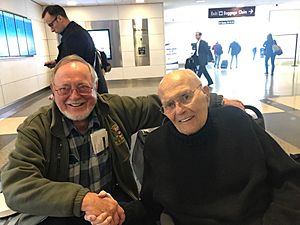
In 2018, Dingell was diagnosed with prostate cancer. He chose not to receive treatment and entered hospice care. John Dingell died on February 7, 2019, at his home in Dearborn, Michigan. On the day he died, a column he wrote was published in The Washington Post. It shared his "last words" for the country.
Legacy
The John D. Dingell Jr. Conservation, Management, and Recreation Act was named in his honor. This law was signed on March 12, 2019. It helps protect land and water. He also received the Walter P. Reuther Humanitarian Award in 2006. A road near Detroit Airport is named after him.
In December 2019, after his wife, Rep. Debbie Dingell, voted to impeach President Donald Trump, Trump made comments about John Dingell at a rally. These comments caused strong criticism from many politicians. They praised John Dingell's legacy and offered support to his widow.
 | Lonnie Johnson |
 | Granville Woods |
 | Lewis Howard Latimer |
 | James West |


